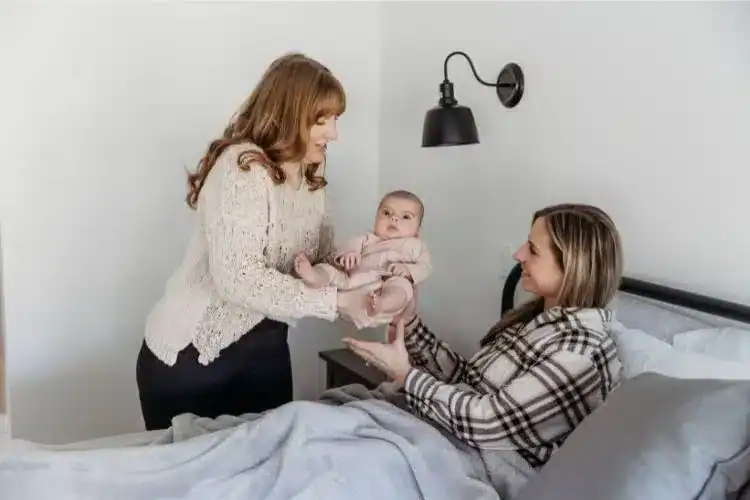Can Sleep Deprivation Cause Postpartum Depression? What Newborn Parents Should Know

New parents expect sleepless nights, but chronic sleep deprivation is more than exhaustion – it’s a known risk factor for postpartum mood disorders like Postpartum Depression. Postpartum Depression (sometimes called Perinatal Depression or PPD) is a mental health condition that can cause deep, ongoing sadness and loss of interest, affecting between 10 and 20% of new parents in the year after birth. A recent study in the Journal of Research in Medical Sciences found that a new parent suffering from “low sleep quality” is three times more likely to be depressed than a parent who sleeps well. While there are many reasons a new parent may develop postpartum depression, lack of sleep is one of the few risk factors that parents and their support networks can actually prevent.
Why is Sleep Important to Mental Health?
Like exercise and eating healthy foods, sleep is a fundamental process that keeps our body, brain, and behavior functioning properly. During sleep, particularly in the rapid eye movement (REM) stage, the brain processes emotions and memories, consolidating information and readying your mind for tomorrow. Sleep also regulates the amygdala (the part of the brain that controls emotions), as well as hormones and neurotransmitters like serotonin, dopamine, and cortisol. Our natural sleep cycles also give all our organs and muscles a chance to rest and repair themselves.
A “good” night’s sleep for a healthy adult is defined as:
- Falling asleep within 5 to 10 minutes after the light is turned off,
- Sleeping at least 7 hours, and
- Spending less than 10% of the night awake.
A “bad” night’s sleep often shows up in two ways: sleep deprivation and sleep fragmentation. Sleep deprivation means not getting enough total hours of sleep in a night, while sleep fragmentation means that sleep is frequently interrupted, often resulting in incomplete sleep cycles.
Numerous studies show that lack of sleep can lead to issues with concentration, decision making, regulating emotions, and serious mental health concerns like depression and anxiety.
Is Lack of Sleep a Symptom of Depression, or Does it Cause Depression?
It’s both. One of the most common symptoms of Postpartum Depression is the inability to sleep, especially when one has the option. Picture a parent staring at the ceiling, unable to sleep, even though the baby is fed, changed, deep asleep, and everyone else in the house is asleep too. Additionally, Postpartum Anxiety can show up as an inability to sleep, with the parent frequently getting up to check that the baby is breathing or going online late at night to check Dr. Google.
At the same time, postpartum fatigue can make depression or anxiety worse. If a new parent is not sleeping enough to function during the day, they may begin to neglect their self-care tasks (like eating, showering, and getting outside) and other responsibilities (like caring for other children, household tasks, or other relationships). This can lead to increased feelings of inadequacy, guilt, and isolation. Also, when a parent is not sleeping enough to regulate their emotions, they may become even more anxious about the baby or their own health, leading to even less sleep!
Why New Parents Can’t Sleep
Even though we know how important sleep is, new parents may already have a hard time getting a good night’s sleep. A birth parent may be dealing with vaginal or perineum pain, or an incision from a cesarean delivery. Staying overnight in a hospital, well-meaning calls and text from loved-ones, and a general upheaval of everyday life may also interrupt a regular sleep routine. The newborn is also waking every few hours to eat, poop, and practice being human, so it tracks that new parents aren’t sleeping through the night either.
Unfortunately, our modern system of parenting does not help new parents (especially mothers) get good sleep. Current expectations of parenthood and guidelines on safe newborn care can even set up the parents for a sleepless night.
- AAP Safe Sleep Guidelines instruct parents to sleep in the same room as the baby for the first six months. That means every time the baby grunts or squirms, the parent may wake to check on them, even if the baby isn’t actually ready to be awake.
- Breastfeeding parents are instructed to “feed on demand,” and warned that going too long between feedings will reduce their milk supply. Additional worries about nipple confusion and overnight pumping may mean that the birth parent is the only person waking for nighttime feedings.
- Lack of daytime help can lead parents to stay up after their infant goes to sleep to get things done, like dishes, food prep, cleaning, and caring for other children or family members. No daytime help also means that parents have no ability to nap and catch up on sleep.
- No paid leave for partners often means one parent “needs their sleep” in order to work the next day, while the birth parent is on duty all night.
Even though we know that sleep is essential to mental health, many new parents simply resign themselves to the idea that they will be intensely exhausted for several months. But it doesn’t have to be that way.
Can improving sleep help with postpartum depression?
This is the good news: YES! Improving sleep can help alleviate some of the symptoms of postpartum depression and can prevent PPD from getting worse. New parents spend a lot of energy prioritizing the baby’s sleep, but it’s just as important to prioritize the parent’s sleep.
A 2024 review of research found that the most reliable way to reduce parental sleep fragmentation and improve mental health symptoms is to have another adult sleep near the baby and take over 1–2 feedings per night. The goal is to allow the parent(s) to sleep uninterrupted for 4–5 hours. Even if the rest of the night is fragmented, one consolidated period of sleep per night shows significant improvement in parents’ mental health symptoms within two to three days. This takes planning and cooperation from your support team, but splitting the overnight into shifts between multiple parents, extended family or other helpers, or a professional postpartum doula is the number one technique for getting better sleep.
There are other ways to improve a parent’s sleep, which are actually very similar to helping a newborn sleep. A cool, dark room with the steady hum of white noise is the perfect sleep environment for both babies and tired parents. Adults can add ear plugs and a sleep mask, plus relaxation techniques or meditation to calm a busy brain. Whoever is taking care of the baby can also help by turning down the volume on any monitors and putting other devices on Do Not Disturb.
Much like treatment for other mental health concerns, if symptoms are getting worse despite the parent’s best efforts to deal with it on their own, it may be time to call in a professional. Speaking with a professional therapist can help parents process negative thought patterns or deal with anxiety. Anti-depressant or anti-anxiety medication may also help alleviate any symptoms that are causing sleep disturbances. Many medications are perfectly fine to take while breastfeeding, so it’s important to talk to your doctor.

How Postpartum Doulas Can Help
All new parents can benefit from a network of support people after they have a baby, and this support is crucial if the parent is dealing with a mental health concern and sleep disruptions. Having a Postpartum Doula or Newborn Care Specialist in that support network can ensure that parents get the best sleep possible in order to treat (or even prevent!) postpartum depression symptoms.
A Postpartum Doula is an ideal person to sleep near the baby and take over nighttime feedings. After the feeding, an overnight doula is also the one to burp, change, and resettle the baby while the parents are long since back to sleep. The doula can also help parents get longer stretches of uninterrupted sleep by resettling a restless baby instead of feeding them right away.
An overnight doula can also help the daytime run more smoothly by washing bottles or pump parts in the morning, or putting baby’s laundry in the wash. A doula can also be a wonderful source of emotional support for a new parent, preventing isolation and validating these sometimes overwhelming feelings. And no matter who is getting up for work the next day, an overnight doula is concerned that EVERYONE gets a good night’s sleep.
Sometimes the age-old advice of “Sleep When the Baby Sleeps” is not enough. Postpartum sleep deprivation is real and is associated with serious mental health concerns. If postpartum fatigue is taking its toll, the first step is to ask for help. A Newborn Care Specialist can be an invaluable member of your support team.
If you’re struggling to rest, our postpartum doulas can help you recover—body, mind, and spirit. Book a call today to get support for you and your baby.

Helpful tips from your team at Well Supported Family.
Expert postpartum and newborn advice you can trust.
Since 2016, Well Supported Family has walked alongside thousands of new parents as they adjust to life with a newborn. Our certified Postpartum Doulas and Newborn Care Specialists offer daytime, overnight, and 24/7 in-home care across the United States, bringing steady, knowledgeable support right to your door. If you’re recovering from birth, navigating feeding, or simply overwhelmed by the lack of sleep, we’re here to make those early days feel a little lighter.
Want to explore in-home care for your new family? Reach out today.
